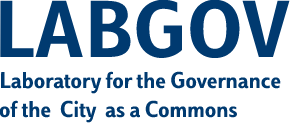Projects

On LabGov mission and goals
LabGov – the “LABoratory for the GOVernance of the City as a Commons” – is an international network of theoretical, empirical and applied research platforms engaged in exploring and developing methods, policies, and projects focused on the shared and collaborative management of urban spaces and resources. LabGov is co-directed by Professor Sheila Foster and Christian Iaione and is hosted at Luiss Guido Carli University, Rome. At Luiss, LabGov is part of the International Center on Democracy and Democratization. LabGov is also an interdisciplinary urban clinic for action-based learning. LabGov’s work is conducted in partnership with various knowledge institutions from across the world. These partnerships, together with a collaborative approach to learning, contribute to LabGov’s mission of building a global community of Co-Cities focused on creating and implementing innovative urban projects designed to make cities more inclusive, sustainable, equitable, and collaboratively governed.
The mission of forging a new breed of innovative models of public-private-community partnerships to make cities more inclusive, sustainable, equitable, innovative and co-governed is extremely relevant for the present project. LabGov team members have a diverse and competitive set of substantial and methodological assets, ranging from law & sustainable innovation, business & finance, political science, planning and sociology. LabGov is a leading organization in the deployment of co-design experiments and facilitation services (for example through the platform “Co-Science”), in the creation and management of virtual spaces enabling urban innovation and experimentalism (such as the platform “Open Urbania”), in platform design, animation and management for different types of mapping tools and processes (for example “commoning.city” and its database), in scientific capitalization and innovative communication and dissemination (such as the cited “Co-Science”, “Open Urbania” and “Collaborative R&I” developed in the framework of the H2020 ENGAGE.EU R&I project).
The first LabGov project was carried out in Bologna and laid the foundation of the “Co-City protocol” that was later tested in other Italian cities, including Battipaglia, Mantua, Reggio Emilia, and Rome. Several municipalities participated in developing innovative Co-City projects and experimenting with territorial collaboration pacts for commons-driven social and economic growth. Other Co-Cities emerged in various European and North American cities, including New York and Amsterdam, shortly followed by other projects in the Global South, in San Jose, Sao Paolo and Accra. LabGov created a Co-Cities database which collects 130+ cities implementing 400+ commons-based projects and urban policies LabGov and closely track their progress to run empirical analysis. Using the knowledge acquired through observation of experimentations in the Co-Cities projects and the database, the first version of the Co-City Protocol was codified. This protocol, which is in constant evolution and adaptable to the needs and conditions of each local context where it is implemented, is a methodology aimed at guiding urban policy makers, researchers, and communities willing to be involved in co-governance experiments.
On LabGov track record
LabGov is engaged in several prestigious EU-funded project, such as the EUARENAS.EU project (Horizon 2020) which explored how local experiments in citizen-focused urban governance can link participatory and deliberative political practices, by engaging citizens in the development of policy toolkits and impact measurement techniques. The knowledge gained is informing actions to tackle the gap between political decision-making processes and citizens in the EU and beyond, delivering crucial lessons for the present project. The OPEN HERITAGE project (Horizon 2020) is also key for the present project as aimed at creating an inclusive governance of cultural heritage sites together with development of heritage communities at its centre, to empower the community in the processes of adaptive reuse. The ENGAGE project (Horizon 2020), a consortium of nine leading European universities in business, economics, and the social sciences, launched Open Urbania, a platform to foster the active engagement of citizens, civil society and regional communities, businesses and public/cities authorities in all stages of the research process. The platform aims at enabling sustainable investment and trigger multistakeholder partnerships models. LabGov is also curating regulatory analysis and stakeholder engagement for the AWARE project (Horizon Europe) pioneers a European RAS – Recirculating Aquaponic System – using reclaimed water for sustainable aquaponics, creating a farm-to-fork value chain. With zero residues the aim is to produce consumable fish and vegetables, fostering economic growth in lakeside, riverside, and urban communities. The project introduces a novel business model, supported by scientific evidence, overcoming policy barriers for widespread adoption and commercialization. Lastly, a more local yet very impactful project is CO-Roma, initiated by LabGov in 2015-2016, applies the Co-City protocol developed by LabGov to Rome. The project focuses on co-governance, involving students, institutions, and local communities to enhance urban commons. Key initiatives include the Centocelle Park Community, which regenerates the area through collaborative actions. The Rome Collaboratory in South-Eastern Rome aims to revitalize Alessandrino, Centocelle, and Torre Spaccata, blending heritage conservation with sustainable tourism and community development.




